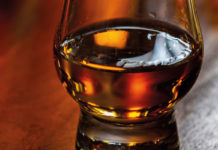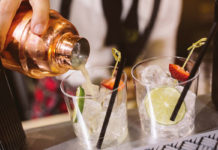
Customers are likely to be seeking out unique products with local credentials
ONE of the drinks trends to have come out of the past couple of years has been an increased interest in – and loyalty to – local products.
And while a raft of local gin brands have appeared over the past decade, another spirits category arguably has an even greater claim to locality: Scotch whisky.
With most distilleries and single malts taking their name from the area they are produced in, each is intrinsically linked to a particular place – and the unique geography that will impact on the production and maturation of that individual whisky.
“It is important to take the time to understand the brands you are serving.”
And as bar and pub customers look for something original and different – not to mention local – brand owners advised that staff should be well versed on the individual stories distinct to each whisky on a venue’s back-bar.
Seb Bunford-Jones, marketing manager at Glasgow Distillery, the company behind the Glasgow 1770 single malt, said it is “important to take the time to understand the brands you are serving and know the stories behind the product”.
“Single malt especially is grounded in a sense of ‘place’ so consider stocking local single malt whiskies which have a true connection to your audience and have an easy to understand story to delight customers with,” said Bunford-Jones.
He was supported by Emmanuel Moine, manager of the Glen Mhor Hotel in Inverness, which is set to open its own distillery and brewery (Uilebheist) on-site.
Moine said it’s important bar and serving staff understand the product because “we’re not just selling liquid, we’re selling a huge piece of cultural history”.
“Knowledge of tasting notes, age statements, production processes and geography help to educate customers and empower them to find the right whisky for them,” he said.
“Enthusiasm can be infectious.”
As prices continue to rise the cost of living is expected to have a knock-on effect on visits to hospitality premises, but brand owners reckoned customers will still be prepared to spend on quality products on the occasions they do visit.
“We have found that the cost of living is a top priority for all consumers,” said Jaclyn McKie, marketing manager at Isle of Arran Distillers, which operates the Lochranza and Lagg distilleries on Arran.
“On-trade trends suggest that people tend to go out less often, however we have also found that they are likely to spend more when they do go out, as they make the most of the on-trade occasion.”
“Cost is a factor, but whisky drinkers are adventurous and want to try new things.”
And Bunford-Jones at Glasgow Distillery said it is “evident that consumers have become more experimental with their drinking habits on their search for new flavour, whilst also gaining new confidence in what and how they drink”.
“As we transition into the colder months, naturally consumers move away from lighter, fruitier spirits and there is a shift towards richer, full-bodied drams, but that’s not to say cocktails will be a distant summer memory,” he said.
“Throughout the pandemic, whisky proved its resilience as we continued to see growth within the category on a global scale and we expect to see this continue throughout the remainder of 2022.”
Moine, at Glen Mhor Hotel, said that, for the moment, the hotel hasn’t seen “any massive changes in demand or purchasing decisions” with regard to whisky.
“Cost is a factor, but whisky drinkers are adventurous and want to try new things,” said Moine.























